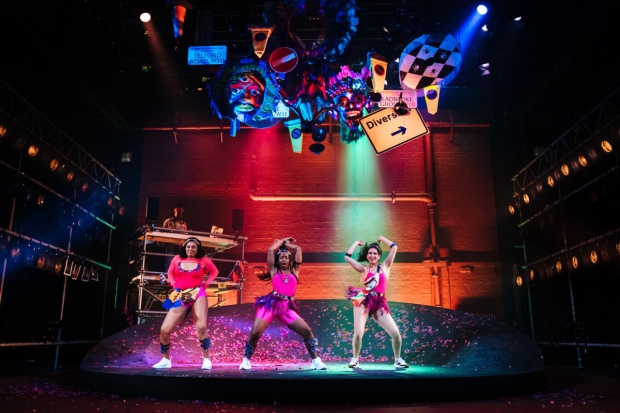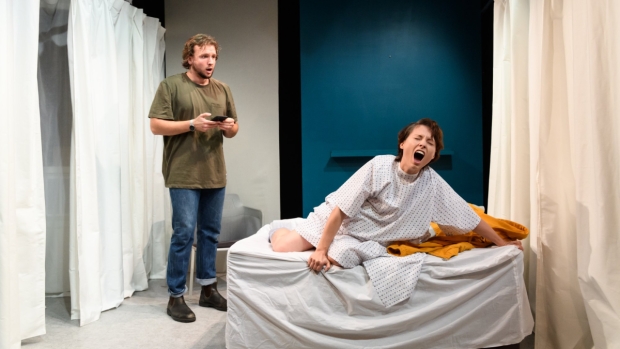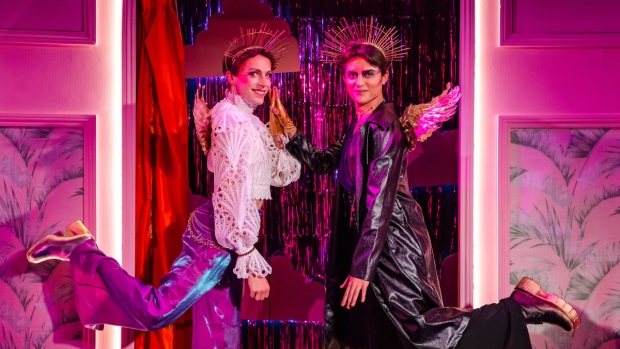”Stray Dogs” at Theatre503 – review

© Dan Tsantilis
New writing is the lifeblood and bedrock of theatre, and Battersea’s small but mighty Theatre503’s whole raison d’être is centred on it. I’ve seen terrific work there from emerging writers, and just occasionally some stuff that wasn’t for me but undoubtedly had merit. I’m flummoxed though by Theo Chester’s Stray Dogs, a grim drama set in a sort of medieval parallel universe pitched somewhere between dystopia and Emmerdale, where haves and have-nots live on opposing sides of city walls while packs of feral wolves roam the surrounding woods. Everybody speaks in a truncated, expletive-peppered version of the English language, short on pronouns and definite articles, but long on pretension. What could it all mean? Is it a parable? Is it an allegory of something? Why is it so bleeding long?!
Jacob and Hilde, the multi-tasking town executioner and his wife (they’re both healers, which is a bit ironic given his inherited profession, and she’s keen to have a baby when she’s not busy eviscerating chickens to feed to the local wildlife) find their domestic status quo upset by the arrival of injured herdsman Wilf, and Ana, the rebellious, gift-bearing wife of a wealthy merchant. What follows is a murky, long-winded tale of discord, divided loyalties, jealousy and loss, couched in dialogue that at its best achieves an earthy naturalism, vaguely redolent of Caryl Churchill in her Vinegar Tom phase, but often sounds self-consciously blunt and obscure.
The characters spend a lot of time staring wistfully and/or fearfully into the middle distance; that’s when they’re not getting ritualistically daubed with blood or water, or furiously telling each other to shut up (excellent advice that unfortunately nobody seems to heed). Stray Dogs takes itself very seriously indeed, but isn’t outlandish enough to make compelling fantasy or interesting enough to engage as real human drama. It’s all portentous ponderousness with little intentional humour, although some of the more overwrought bits are pretty funny (“Franz took my house from me. So I ripped his tooth out. With my bare hands”).
Tommo Fowler’s visually arresting production is rich in claustrophobic atmosphere but is periodically scuppered by mystifyingly unfocused blocking; for instance, any tension in a second act confrontation between Jacob, Ana and a semi-civilised woodland dweller named Pig, the sort of figure who constantly and tiresomely refers to himself in the third person, is dissipated by having the three characters aimlessly shuffling around the playing area for no discernible purpose. Jose Guillermo Puello’s shuddering, omnipresent sound design and Megan Lucas’s starkly dramatic lighting succeed in creating some tension however, as does the practice of having the actors sit broodingly on chairs observing the action when not engaged in scenes.
At one point Wilf tells Jacob “you’re no Christ” but the executioner’s messianic devotion to healing and saving people suggests possibly otherwise. This idea is amplified by the striking final image of Hilde washing clean a blood-soaked, semi-naked Jacob, like Mary Magdalene and Jesus, in front of a metallic structure resembling a crucifix. It’s an intriguing concept but feels like an under-explored non sequitur, like so much else in this bloated yet curiously half-baked script.
The actors work hard to breath life into a punishingly lengthy evening. Graham Butler and Abbey Gillett find real passion and pain in Jacob and Hilde, and Coral Wylie invests Wilf with a refreshing, wiry energy. Ruxandra Porojnicu fares less well as the privileged Ana, largely I think because the writing for her character is all over the place. It’s just never terribly clear what motivates this conflicted woman, and Porojnicu struggles with audibility and intelligibility in moments of high stress. Graeme McKnight achieves a creditably vivid contrast between two wildly differing characters.
To his credit, Chester’s vision, however bleak, is consistent thoughout, and he succeeds in steering his audience into a thoroughly imagined alternative reality. It’s just a shame that once there, we’re mired in so much self-indulgent waffle and confused storytelling. This feels like a rare misstep for this normally excellent venue.














